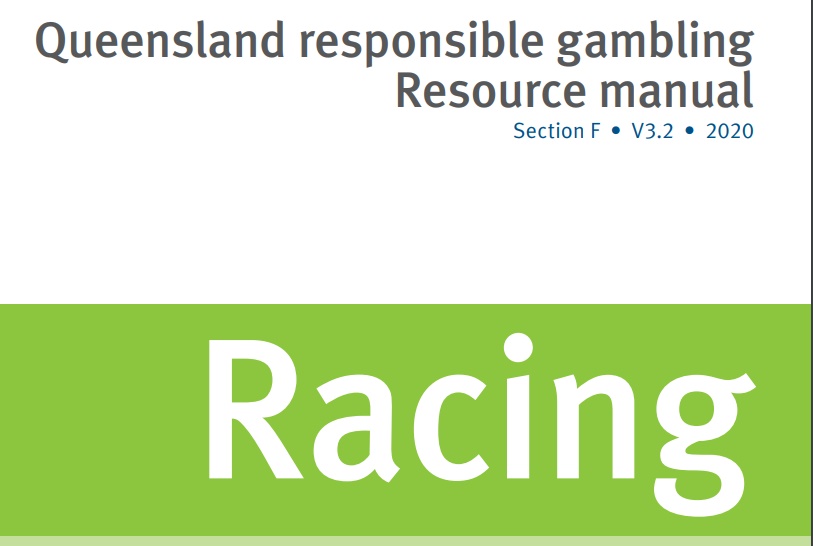What you see below are extracts from the Dept of Justice and Attorney General issues Queensland Responsible Gambling Manual, as it applies to the Capalaba Greyhound Racing Club and it’s 4.5 x 1.8m large semaphore board advertising for its sponsor the quick cash money lender Swoosh Finance.
This racing resource manual was developed by industry in collaboration with the Office of Liquor and Gaming Regulation. It provides the racing industry with a step-by-step guide to implementing the Queensland Responsible Gambling Code of Practice.
In our view the Capalaba club does not comply with the responsible gambling conduct requirements laid down by the State Government, and is guilty of highly irresponsible gambling practices.
Here is why.
1.2A – Responsible Gambling Policy
Introduction
The racing industry has developed the Responsible gambling policy to minimise the potential harm associated with gambling. In developing the Policy, the racing industry has realistically taken into account:
• community concerns on potential harm associated with gambling
• the role of the racing industry in providing a responsible gambling environment
• the rights and responsibilities of customers who may have a gambling-related problem.
As a self-regulatory and voluntary instrument, the Policy demonstrates the racing industry’s commitment to minimising the potential harm associated with gambling on its employees, customers and the community.
Policy goals
The goals of the Responsible gambling policy are to:
- manage potential harm by creating a responsible gambling environment
- educate and inform employees, customers and the community about potential harm
- create awareness of significant benefits that will arise where employees, customers and the community assist the racing industry in its
endeavours to minimise potential harm - ensure compliance with the Queensland responsible gambling Code of Practice (Code of Practice)\.8 Minors or vulnerable or disadvantaged groups
6.8 Minors or vulnerable or disadvantged groups
Strategies will ensure that any advertising or promotion is not implicitly or explicitly directed at minors or vulnerable or disadvantaged groups.
Vulnerable or disadvantaged groups
Advertising and promotion is not directed primarily at vulnerable or disadvantaged groups by linking social and financial betterment issues to gambling.
Disadvantaged persons may include persons lacking social or economic access, due largely to inadequate income, an inadequate standard of living in terms of housing, food, clothing and health care and lacking opportunities to fully participate in society through education, employment and social pursuits.
Vulnerable persons may include persons at risk of harm or harmful patterns of behaviour due to external influences or internal susceptibilities.
Comment
Problem gamblers are vulnerable people.
So are gamblers at risk of developing a problem.
They are people who are at high risk of harm or harmful behavior due to the external influence of being on a racetrack or watching races, and seeing large sized advertisements for a third tier-lender who can instantly approve their application for a loan and put it in their account immediately via Pay ID.
Anyone who doesn’t think they are going to punt with the ready cash provided by the Capalaba Greyhound Club’s sponsor that they’ve found through the Capalaba club’s semaphore board ads is a fool who doesn’t understand problem gambling at all.
Disadvantaged persons are those with inadequate income or means.
Who else but a disadvantaged or vulnerable person would need to take out a short term loan secured against their car at 47% interest plus a $400 service fee?

6.10 Irresponsible trading practices
Strategies will ensure that any advertising or promotion does not involve any irresponsible trading practices by the gambling provider.
Actions of the gambling provider
Race clubs and bookmakers will use acceptable trading practices in all advertising and promotions
Comment
Promoting am instant access payday loan service to gamblers – approximately 2 in 5 of whom research shows are at risk of being problem gamblers, and 1 in 10 who are likely to already be – is not a responsible trading practice when these advertisements are being shown on a racecourse during races that are televised around Australia and abroad.
6.13 Responsible gambling messages
Strategies will ensure that any advertising or promotion incorporates responsible gambling messages (where applicable).
Actions of the gambling provider
Race clubs and bookmakers will include a responsible gambling message (e.g. ‘Gamble responsibly’) and/or images in all publications and
electronic media.
Comment
There is no responsible gambling message on the Capalaba semaphore board, which is an electronic medium advertising the high interest pay day lender Swoosh Finance.
There certainly should be.
Enforcement action, including disciplinary proceedings, should be instituted against the Capalaba club for its failure to comply with the mandatory government policy about responsible gambling conduct.
If changes aren’t implemented immediately its license to race should be withdrawn.

